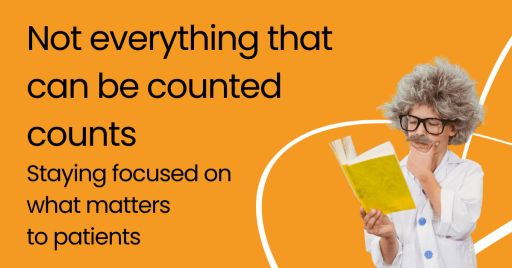
An update from Aparito CEO, Dr Elin Haf Davies.
Over the last three months, I have been privileged to co-author three papers.
Each one is different, but each one with the same central theme, the patient, and each one with the word patient in the title:
Tanya Collin-Histed, Madeline Stoodley, Kathleen Beusterien, Deborah Elstein, Dena H. Jaffe, Shoshana Revel-Vilk, Elin Haf Davies on behalf of the International Gaucher Alliance(2023) A global neuronopathic Gaucher disease registry (GARDIAN): a patient-led initiative (IGA) Orphanet Journal of Rare Diseases volume 18, Article number: 195

Aiyegbusi, O.L., McMullan, C., Hughes, S.E., Davies, E.H., et al. Considerations for patient and public involvement and engagement in health research. TLC Study Group (2023) Nature Medicine

Wicks, P., Wahlstrom-Edwards, L., Fillingham, S., Downing, A., Davies E.H (2003) So You Want to Build Your Disease’s First Online Patient Registry: An Educational Guide for Patient Organizations Based on US and European Experience The Patient – Patient-Centered Outcomes Research volume 16, pages 183–199

My co-authors for the three papers are different collaborators, but all are focused on the importance of incorporating the patient’s voice into research and enabling the patient’s voice to be captured in a methodologically robust way.
Turning their voices into data.
Over the two-plus decades that I’ve worked in clinical research, I’ve been notably aware that ‘Not everything that can be counted counts and not everything that counts can be counted‘ (as attributed to Albert Einstein).
From the first clinical trial I supported I realised that the endpoints used in clinical trials very rarely reflect what’s important to patients and families in their day to day.
That first clinical trial remains the driver for much of my work in neuronopathic Gaucher disease, and despite the challenges along the way, our paper in Orphanet describing the “A global neuronopathic Gaucher disease registry (GARDIAN)” and our efforts to develop disease-specific Patient Reported Outcomes and data-driven insight to guide better clinical trial designs in the future.
Ultimately, insight and new knowledge are generated through data, and data is required to convince the regulators and reimbursement agencies that new medicines have the efficacy and effectiveness to be approved and reimbursed.
While it’s the personal story that wins the hearts and minds via a headline story, the personal story is not what gets medicines approved: “Bring me data, not tears” is the well-known line reported to be told by an FDA to a mother of a child living with a rare life-threatening illness while reviewing a dossier for approval.
Put another way, “In God we trust, all others must bring data”.
Much has changed in the role of patients in the design and approval of medicines over the last two decades. Our recent blog with Neil Bertelsen reflects on the birth of modern patient advocacy back in the 1980s. “That led to the FDA forming what is now their patient engagement policy, and it started with its HIV-specific patient council that advised the FDA and was later expanded to include more diseases”.
As Aparito rapidly approaches its ninth birthday it’s time to pause and review the data to reflect on where we’re at today. Are we still driving towards the original mission? Personally, there is pride that I have managed to maintain the patient central to all that I aspired to do with Aparito.
Being awarded the Made WITH Patient Raising Star for my work in patient engagement was also an important external reflection of our ongoing achievements via the Patient Group Accelerator, which brings me immense satisfaction

Is what is being measured truly what matters?
But there seems to be a dichotomy between the achievements that can be measured in numbers and the aspects that bring me the most pride.
How does one quantify the achievements over the last nine years? Do we focus on
- the number of patients that have engaged with our Atom5™ platform?
- the number of features that Atom5™ now has?
- the number of studies that we’ve implemented?
- the number of countries that we’re in?
- the number of scientific publications and their respective impact factors?
- the number of staff that we employ?
- the amount of investment we’ve raised?
- the amount of revenue growth that we can show year-on-year?
It’s easy to be pulled away by other priorities; product, processes, pricing – all inevitable demands to be considered while working towards the ultimate goal of patient value.
But working on a product without considering the patient, focusing on the process without involving the patient, and negotiating a price without evaluating the patient value is to be distracted from the main purpose.
What a decade it’s been to grow a global med-tech company: a pandemic, war in Europe, raging fires from the impact of climate change, and a high number of refugees losing their lives as they attempt to cross waters for a safer life.
Some notable digital health companies that closed significant investments and sky-high valuations have crumbled, and the macro-economic continues to be unpredictable.
As the pressures of building a company take their toll, I now have greater confidence to walk away from those who don’t buy into the mission, and to only work with people who have the same vision during the highs and the lows!
People that stick with you through thick and thin, and are good, fun, kind people to work with.
As we look towards our 10th year, I remain fully committed to the goal that I set for myself when I founded Aparito, to support patient-centric clinical trials by measuring what matters to patients.
